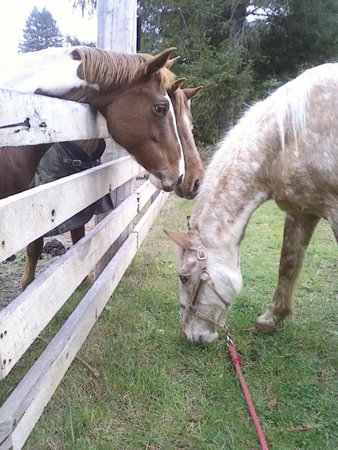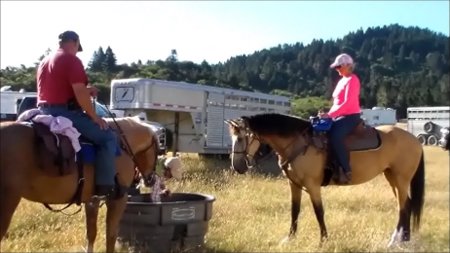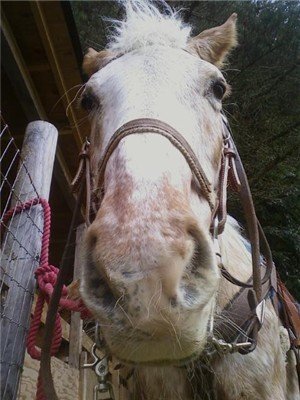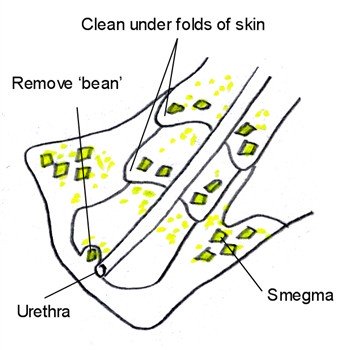Equine Strangles
Equine strangles is another term for equine distemper. Strangles is a highly infectious disease that affects the upper respiratory tract of horses. It is caused by the bacteria Streptococcus equi. Strangles most often affects young horses, but can affect any horse that has not been vaccinated or had strangles before.
Strangles is Highly Contagious
 Once infected, about 75% of horses will develop an immunity to strangles.
Once infected, about 75% of horses will develop an immunity to strangles.Signs of Equine Strangles
- High fever reaching temperatures of up to 106º
- Abscessed lymph nodes in the lower jaw and throat area
- Copious amounts of nasal discharge
- Loss of appetite
- Inflammation and swelling of the throat and neck
Strangles has an incubation period of 3-6 days, but occasionally horses will not show signs for up to 21 days. Loss of appetite and fever are followed by swollen pus filled lymph nodes and a runny nose.
The lymph nodes become abscessed with pus. The abscesses mature and drain in 10-14 days. This process can be sped up with the application of hot packs to help the abscesses to mature faster. Then they can be lanced and drained by a veterinarian.
A runny nose, swollen throat and pus filed lymph nodes make it difficult for the horse to breathe, thus the term ‘strangles.’ Horses may stand with an outstretched neck in order to breathe better. In severe cases the horse may need to have a tracheotomy.
A tracheotomy is a procedure where a hole is cut directly into the windpipe of the horse. This allows the animal to breathe air directly from the tracheotomy hole and bypass the clogged air passages all together. This is a temporary emergency procedure and the vet will close the tracheotomy hole when it is no longer needed.
How Equine Strangles is Spread
Equine distemper is spread through contact with the pus, saliva and nasal discharge of infected animals. It can be passed directly from one animal to another or from contaminated water a troughs and common feeding areas and human contact with an infected horse to a healthy horse. Flies can also spread the bacteria from one animal to another. Infected horses should be quarantined.
 Keep your horse current on vaccines
Keep your horse current on vaccinesHorses remain contagious for up to 4 weeks after the disease has run its course!
Treatment for Equine Strangles
The only treatment for strangles is complete rest and nursing care. The animal should be monitored to assure their ability to breathe. Antibiotics are not recommended except in very extreme cases. The use of antibiotics has been known to cause the abscesses to spread to other parts of the body. This is referred to as ‘bastard strangles’. Bastard strangles is much less common and has a higher risk of death.
Horses can be vaccinated for strangles but not during an outbreak. The vaccines only last for 6-12 months and must be given regularly to maintain coverage. Unfortunately the vaccines are not fool-proof. Up to 50% of vaccinated animals will still get equine strangles when exposed to the disease.
Not every horse that is exposed to strangles will contract the disease. The greater the exposure to equine distemper the higher the odds of coming down with the disease.
Foals and horses that are stressed are at more risk if exposed to the strangles bacteria. Stress can be caused from poor nutrition, ill health and long stressful transportation.
Lower the Risk of Equine Strangles:
- Vaccinate your horse for Equine Distemper
- Minimize direct contact with other horses at events
- Stay away from public water troughs when possible
- Wash your hands often when at events
- Allow for plenty of rest stops when traveling long distances with horses
More Equine Health Articles:
Horse Vaccines
Horse vaccines protect against deadly respiratory and neural diseases. Learn which ones you can give yourself.
Horse First Aid Kit
Find out what items you need to build a well rounded horse first aid kit for your barn, your truck and on the trail.
Horse Sheath Care
Learn the in's and out's of horse sheath cleaning for your gelding. It's not as difficult at it first seems!
This information is written for the horseman to better understand and cope with the variety of disease and injury that can occur during the course of horse ownership. Always consult with your Veterinarian regarding the care and treatment of your equine.
Home > Horse Diseases > Equine Strangles


